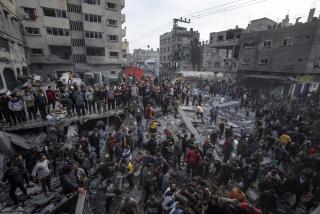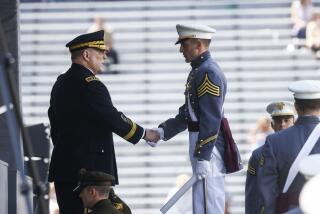U.S. Was Ready for 20,000 Casualties--Schwarzkopf : Gulf War: General tells senators he now expects Hussein to remain in power for the foreseeable future.
- Share via
WASHINGTON — American military planners in the Persian Gulf anticipated that as many as 20,000 U.S. troops might be killed or wounded in the war with Iraq, Gen. H. Norman Schwarzkopf disclosed Wednesday.
Schwarzkopf, breaking a long official silence on the question of expected war casualties, told a Senate committee that at the outbreak of the war, U.S. forces in the region had in place 18,000 hospital beds in 65 facilities staffed by 41,000 medical personnel to handle the expected heavy flow of casualties.
While Schwarzkopf said that the 20,000 figure represented a “worst-case estimate,” the number is higher than those from most private analysts. Estimates of U.S. casualties and the number of available hospital beds were closely guarded during the war by senior American officials, who feared that disclosure of the figures would erode public support for the war.
Actual American combat casualties during the 43-day war were 147 killed and 357 wounded.
In testimony Wednesday before two congressional committees, Schwarzkopf also said that at the end of the war, he expected Saddam Hussein to be deposed quickly by his own people. But now he anticipates that the Iraqi leader will remain in power for the foreseeable future, he said.
“I think that in the short term he will continue in office because of the internal unrest that they’re having within Iraq,” said Schwarzkopf, who appeared before the Senate Armed Services Committee.
But the general, who was commander in chief of allied forces in the Persian Gulf, predicted that worldwide economic sanctions against Iraq will cause continued domestic hardships and eventually lead to Hussein’s ouster.
“Iraq is not going to recover as a member of the international community so long as Saddam Hussein is its leader,” he said. “I just think that he is not going to survive, only because it’s not in the best interests of Iraq that he survive. And his own countrymen are going to recognize that in the future, once there’s stability inside Iraq.”
Schwarzkopf also defended the decision to cease ground combat after four days, saying that another day or week of fighting “would have made absolutely no difference at all in the outcome” for Kurdish and Shiite Muslim rebels, thousands of whom were later slaughtered by Iraqi troops who survived the allied offensive.
He said that U.S. military goals had been accomplished after 100 hours of ground fighting. “Further war would have simply been that,” Schwarzkopf said. “It would have been further bloodshed. It would have been killing on the part of our troops, wanton killing and destruction.”
Schwarzkopf said that Gen. Colin L. Powell, chairman of the Joint Chiefs of Staff, called him the night before the United States declared a cease-fire and asked if he had “any problem with” halting combat the following morning. Schwarzkopf said he replied: “We’ve accomplished our military objectives, and that’s as good a time as any other to cease the war.”
Schwarzkopf touched off a controversy in March when he said in a television interview that he had recommended that the U.S. forces “continue the march” against the Iraqis to complete their destruction. He has since disavowed the comments and defended President Bush’s decision to stop the fighting.
He said Wednesday that Hussein retained 770,000 troops outside the Kuwaiti theater that could have been used to suppress the dissent, as well as 623,000 soldiers in the theater, many of whom escaped allied destruction. Since the war, he said, Iraq has been able to reconstitute four divisions of the 42 that were destroyed during the allied offensive.
The Pentagon’s previous public estimate of Iraqi troop strength in the theater was 545,000, and that number has been criticized since the war by knowledgeable analysts as probably too high. Defense officials could not explain the discrepancy between the figures.
Schwarzkopf, making his first postwar appearances as a witness before congressional committees, also listed the military’s chief problems during the war, including difficulties with battlefield intelligence, inadequate mine-clearing capabilities, incompatible communications systems and shortages of heavy trucks, boots, hot meals and tank ammunition.
He also said that, while his forces were prepared for a missile-launched chemical attack, he never believed that the Iraqis could deliver poison gas on their Soviet-designed Scud missiles.
And while Schwarzkopf praised the performance of women GIs in the conflict, he said he believes that women do not belong on the front lines.
Schwarzkopf, the father of two daughters, said: “I have for a very long time said that I do not believe that we want all of our infantry battalions to be 50% men and 50% women. I think we would lose something in the ability to defend our nation if we had women being required to be down there in the trenches with bayonets fighting hand-to-hand with the enemy forces.”
Schwarzkopf said that the United States had invested heavily in sophisticated reconnaissance satellites but lacked responsive battlefield surveillance systems that could get timely information to ground commanders and pilots.
He said Air Force officers told him that in previous conflicts pilots sent on bombing missions carried with them aerial photographs of their targets that were less than 24 hours old.
“And therefore, as the battlefield changed, they were up to date on the changes that occurred in the battlefield,” the general said. “We didn’t have that capability in this (war), and that’s what we mean by tactical intelligence.”
He urged that the nation invest in new systems capable of delivering “real time” intelligence to battlefield leaders.
Schwarzkopf also complained that intelligence agencies in Washington were too conservative in their estimates of allied bombing damage to the Iraqi army. He said that their reports were so vague and couched in qualifiers that “no matter what happened, it would have been right. That is not helpful.”
He added: “I would tell you, very candidly, that based upon some of the analysis that we were getting, we’d still be sitting over there waiting” to attack Iraq.
Analysts at the CIA and the Defense Intelligence Agency relied solely on overhead photographs of targets and were reluctant to credit “kills” of enemy equipment unless the evidence was unambiguous.
Commanders in Saudi Arabia, however, relied on reconnaissance photos, pilot reports and subjective judgments to conclude that after four weeks of bombardment the Iraqi army was “on the verge of collapse,” in Schwarzkopf’s words.
More to Read
Sign up for Essential California
The most important California stories and recommendations in your inbox every morning.
You may occasionally receive promotional content from the Los Angeles Times.













